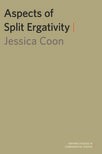 Aspects of Split Ergativity
Aspects of Split Ergativity
Contents
-
-
-
-
-
-
-
-
5.1 Introduction 5.1 Introduction
-
5.1.1 Split Patterns 5.1.1 Split Patterns
-
5.1.2 (T)A(M) Splits 5.1.2 (T)A(M) Splits
-
-
5.2 Laka (2006) and Split Ergativity in Basque 5.2 Laka (2006) and Split Ergativity in Basque
-
5.3 Three Types of Aspectual Split 5.3 Three Types of Aspectual Split
-
5.3.1 Ergative to Neutral 5.3.1 Ergative to Neutral
-
Nakh-Daghestanian Nakh-Daghestanian
-
Indo-Aryan Indo-Aryan
-
Jê: Mẽbengokre and Kĩsêdjê Jê: Mẽbengokre and Kĩsêdjê
-
-
5.3.2 Ergative to Extended Ergative 5.3.2 Ergative to Extended Ergative
-
5.3.3 Ergative to ABS-OBL 5.3.3 Ergative to ABS-OBL
-
5.3.4 Summary 5.3.4 Summary
-
-
5.4 Analysis 5.4 Analysis
-
5.4.1 Split Subjects Are Intransitive Subjects 5.4.1 Split Subjects Are Intransitive Subjects
-
5.4.2 Previous Analyses 5.4.2 Previous Analyses
-
5.4.3 Structure and “Counteruniversal” Splits 5.4.3 Structure and “Counteruniversal” Splits
-
5.5 Split Ergativity Conclusions 5.5 Split Ergativity Conclusions
-
-
-
-
-
-
-
5 Beyond Mayan: Extending the Analysis
Get access-
Published:September 2013
Cite
Abstract
This chapter shows that the pattern of aspect-based split ergativity—in which “split” aspects involve more complex structure than nonsplit aspects—is not limited to Chol, or even the Mayan family, but in fact is found in a number of genetically unrelated and geographically distant languages. It examines splits in Basque, Nakh-Daghestanian, Indo-Aryan, Jê, Kartvelian, Pama-Nyungan, and Polynesian language families. It shows that the factors triggering these splits are not limited to ergative languages but are present in more familiar nominative-accusative systems as well, for example, in English, Dutch, and French. It argues that split person-marking in the nonperfective aspect results from the fact that nonperfective aspects are frequently expressed as locative constructions.
Sign in
Personal account
- Sign in with email/username & password
- Get email alerts
- Save searches
- Purchase content
- Activate your purchase/trial code
- Add your ORCID iD
Purchase
Our books are available by subscription or purchase to libraries and institutions.
Purchasing information| Month: | Total Views: |
|---|---|
| November 2022 | 1 |
| May 2023 | 3 |
| September 2023 | 1 |
| October 2023 | 1 |
| February 2024 | 2 |
| March 2024 | 1 |
| April 2024 | 1 |
| May 2024 | 2 |
| June 2024 | 2 |
| August 2024 | 1 |
| December 2024 | 4 |
| January 2025 | 2 |
| April 2025 | 8 |
| May 2025 | 1 |

Get help with access
Institutional access
Access to content on Oxford Academic is often provided through institutional subscriptions and purchases. If you are a member of an institution with an active account, you may be able to access content in one of the following ways:
IP based access
Typically, access is provided across an institutional network to a range of IP addresses. This authentication occurs automatically, and it is not possible to sign out of an IP authenticated account.
Sign in through your institution
Choose this option to get remote access when outside your institution. Shibboleth/Open Athens technology is used to provide single sign-on between your institution’s website and Oxford Academic.
If your institution is not listed or you cannot sign in to your institution’s website, please contact your librarian or administrator.
Sign in with a library card
Enter your library card number to sign in. If you cannot sign in, please contact your librarian.
Society Members
Society member access to a journal is achieved in one of the following ways:
Sign in through society site
Many societies offer single sign-on between the society website and Oxford Academic. If you see ‘Sign in through society site’ in the sign in pane within a journal:
If you do not have a society account or have forgotten your username or password, please contact your society.
Sign in using a personal account
Some societies use Oxford Academic personal accounts to provide access to their members. See below.
Personal account
A personal account can be used to get email alerts, save searches, purchase content, and activate subscriptions.
Some societies use Oxford Academic personal accounts to provide access to their members.
Viewing your signed in accounts
Click the account icon in the top right to:
Signed in but can't access content
Oxford Academic is home to a wide variety of products. The institutional subscription may not cover the content that you are trying to access. If you believe you should have access to that content, please contact your librarian.
Institutional account management
For librarians and administrators, your personal account also provides access to institutional account management. Here you will find options to view and activate subscriptions, manage institutional settings and access options, access usage statistics, and more.